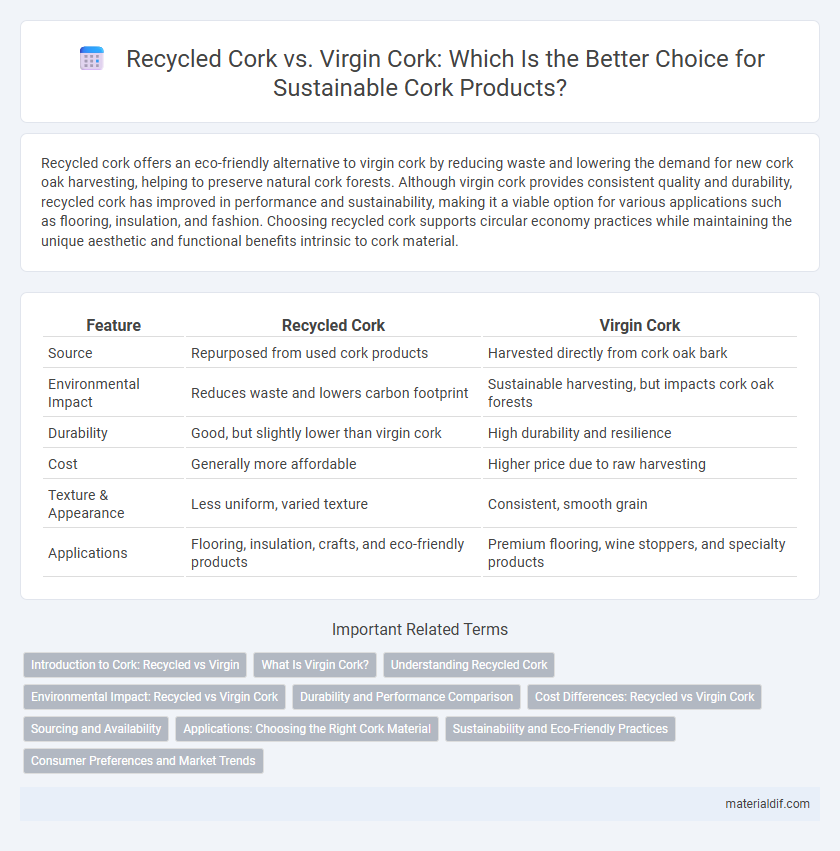Recycled cork offers an eco-friendly alternative to virgin cork by reducing waste and lowering the demand for new cork oak harvesting, helping to preserve natural cork forests. Although virgin cork provides consistent quality and durability, recycled cork has improved in performance and sustainability, making it a viable option for various applications such as flooring, insulation, and fashion. Choosing recycled cork supports circular economy practices while maintaining the unique aesthetic and functional benefits intrinsic to cork material.
Table of Comparison
| Feature | Recycled Cork | Virgin Cork |
|---|---|---|
| Source | Repurposed from used cork products | Harvested directly from cork oak bark |
| Environmental Impact | Reduces waste and lowers carbon footprint | Sustainable harvesting, but impacts cork oak forests |
| Durability | Good, but slightly lower than virgin cork | High durability and resilience |
| Cost | Generally more affordable | Higher price due to raw harvesting |
| Texture & Appearance | Less uniform, varied texture | Consistent, smooth grain |
| Applications | Flooring, insulation, crafts, and eco-friendly products | Premium flooring, wine stoppers, and specialty products |
Introduction to Cork: Recycled vs Virgin
Recycled cork is made by repurposing post-consumer cork waste, preserving natural resources and reducing environmental impact, while virgin cork is harvested directly from cork oak trees through sustainable stripping processes. Virgin cork typically offers superior elasticity and durability, essential for premium wine stoppers, but recycled cork serves efficiently in insulation, flooring, and composite materials. Choosing between recycled and virgin cork depends on the specific application requirements, balancing performance with sustainability goals.
What Is Virgin Cork?
Virgin cork is harvested directly from the cork oak tree's bark without any previous processing or reuse, ensuring optimal elasticity and durability. It retains all natural properties, making it ideal for premium products such as wine stoppers and high-quality flooring. Compared to recycled cork, virgin cork offers superior performance in terms of strength and moisture resistance due to its untouched cellular structure.
Understanding Recycled Cork
Recycled cork is made from previously used cork materials, reducing environmental impact by minimizing waste and conserving natural cork forests. Unlike virgin cork harvested directly from cork oak trees, recycled cork maintains the same lightweight, elastic, and waterproof properties while supporting sustainable production. Understanding recycled cork involves recognizing its role in eco-friendly manufacturing and its growing popularity in products like flooring, insulation, and fashion accessories.
Environmental Impact: Recycled vs Virgin Cork
Recycled cork significantly reduces environmental impact by minimizing waste in landfills and decreasing the demand for cork oak harvesting, thereby preserving biodiversity and forest ecosystems. Virgin cork production involves harvesting bark from living cork oak trees, which supports tree growth but can lead to habitat disruption if not managed sustainably. Using recycled cork lowers carbon emissions and energy consumption compared to virgin cork, making it a more eco-friendly choice for sustainable product manufacturing.
Durability and Performance Comparison
Recycled cork offers enhanced sustainability but may exhibit slightly reduced durability compared to virgin cork, which retains natural elasticity and strength due to its unprocessed state. Virgin cork maintains superior resilience, water resistance, and longevity, making it ideal for flooring and insulation applications requiring long-term performance. The choice hinges on balancing environmental benefits with functional demands, where virgin cork excels in high-wear scenarios while recycled cork suits eco-conscious uses with moderate durability needs.
Cost Differences: Recycled vs Virgin Cork
Recycled cork generally costs 15-30% less than virgin cork due to lower raw material expenses and reduced processing requirements. Virgin cork, harvested directly from cork oak trees, involves more labor-intensive extraction and quality control, driving up prices. Businesses often prefer recycled cork for budget-friendly applications without sacrificing durability or sustainability benefits.
Sourcing and Availability
Recycled cork is sourced from post-consumer cork products, such as wine stoppers and flooring materials, and its availability depends on the collection and recycling infrastructure in cork-producing regions like Portugal and Spain. Virgin cork, harvested directly from cork oak trees primarily in the Mediterranean basin, requires a meticulous stripping process every 9 to 12 years, making it less readily available but higher in quality. Both materials contribute to sustainable cork markets, but recycled cork offers a more consistent supply due to continuous reuse of existing cork products.
Applications: Choosing the Right Cork Material
Recycled cork, made from repurposed agglomerated granules, is ideal for sustainable products such as flooring, insulation, and fashion accessories, offering environmental benefits and cost efficiency. Virgin cork, harvested directly from cork oak bark, provides superior elasticity and durability, making it the preferred choice for premium wine stoppers and high-performance gaskets. Selecting between recycled and virgin cork depends on application requirements, balancing factors like mechanical strength, texture, and eco-friendliness.
Sustainability and Eco-Friendly Practices
Recycled cork significantly reduces environmental impact by minimizing waste and preserving cork oak forests, supporting biodiversity and carbon sequestration. Virgin cork harvesting involves carefully stripping bark without harming the tree, promoting sustainable forest management and ensuring continuous cork production. Both recycled and virgin cork contribute to eco-friendly practices through biodegradability, low energy processing, and reducing reliance on synthetic materials.
Consumer Preferences and Market Trends
Consumer preferences in the cork industry are increasingly shifting towards recycled cork due to its environmental benefits and sustainable sourcing. Market trends indicate a growing demand for recycled cork products in sectors such as flooring, fashion, and home decor, driven by eco-conscious consumers. Virgin cork remains valued for its natural quality and durability, but recycled cork's cost-effectiveness and lower ecological footprint are accelerating its market prominence.
Recycled Cork vs Virgin Cork Infographic

 materialdif.com
materialdif.com